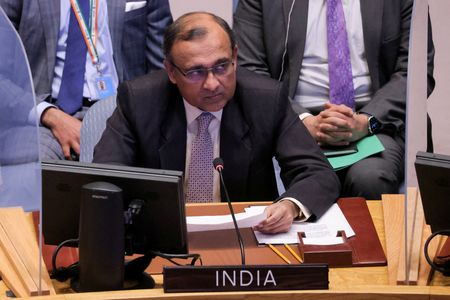
India expresses concern about discriminatory, inferior status accorded to women in Afghan society

United Nations, Jun 15 (PTI) India on Wednesday expressed its concern about the discriminatory inferior status accorded to women in the Afghan society which has adversely impacted the education of girls in the war-torn country, while underlining the need for the Security Council to focus its attention on consequences of terrorism on the rights of women.
Addressing the UN Security Council Open Debate on Women and Peace and Security, India’s Permanent Representative to the UN Ambassador T S Tirumurti said discriminatory social and political structures have made violence against women systemic and deeply entrenched, making women easy targets in situations of armed conflict. He underlined India’s deep conviction that a conducive environment for the participation and inclusion of women in political processes is indispensable for peace.
“To foster such an enabling environment, democratic polity, pluralism and the rule of law are essential prerequisites. For stability in our region, we have therefore been underlining the importance of inclusive and representative governance in Afghanistan, with the meaningful participation of women,” Tirumurti said. “We are particularly concerned about the discriminatory inferior status being accorded to women in the Afghan society, which has inter alia adversely impacted the education of Afghan girls,” he added.
The Indian envoy further emphasised that terrorism and violent extremism continues to be the biggest violator of human rights and a persistent threat to global peace and security. “Needless to say, women and girls invariably suffer disproportionately by terror acts. It deserves strong condemnation and call for adoption of a zero tolerance approach,” he said.
“The Security Council must focus its attention on the consequences of terrorism on the rights of women,” Tirumurti said. While noting that internet and social media networks have the potential to augment women’s voice and increase their participation, he lamented that extremist groups and terrorists have increasingly exploited these tools to the detriment of women. “They have threatened women who are active in public life, muzzled their voices, amplified discriminatory ideas and promoted violent radicalisation,” Tirumurti said. He noted that countering such misuse requires a non-discriminatory and collective effort through a whole-of-society approach.
Tirumurti said regarding conflict situations, the United Nations, regional organisations and the international community have a special responsibility towards women. Checking impunity and stopping violence and exploitation in conflict situations has to be of paramount importance. “The nature of peacekeeping and peacebuilding has changed to accommodate these imperatives. In this regard, it is important that we factor in growing concerns emanating from the misuse of new and critical technologies,” he said.
Tirumurti stressed that women police officers and peacekeepers have played a critical role in preserving women’s peace and security agenda. “Having women peacekeepers is crucial to the success of peacekeeping missions. It also brings in greater access to civilians and other stakeholders, as well as additional skill sets for the peacekeeping team,” he said. Women peacekeepers also serve as powerful mentors and role models for women and girls in post-conflict settings, inspiring grit and resilience in female victims to champion their own rights and pursue non-traditional careers.
“India welcomes the uniform gender parity strategy to increase the number of women peacekeepers. We also support increasing the deployment of women protection advisors for effective monitoring, analysis and reporting arrangements on sexual violence in conflict,” Tirumurti said. “Just as a bird cannot fly with one wing, durable peace cannot be achieved without the active participation of the other gender. Our active commitments and actions towards global peace must be anchored on this premise,” he said.
He also highlighted that India’s political and developmental trajectory has navigated several complex challenges through its women-centric initiatives. “From women’s development to women-led development, women in India are driving India’s development,” Tirumurti said.

















POST COMMENTS (0)